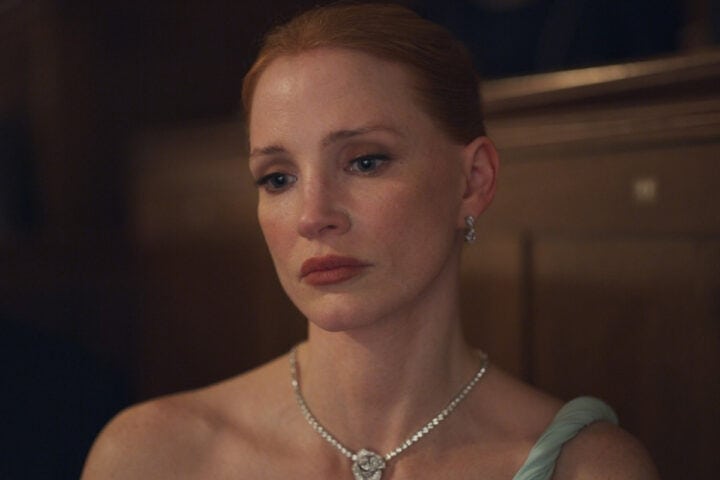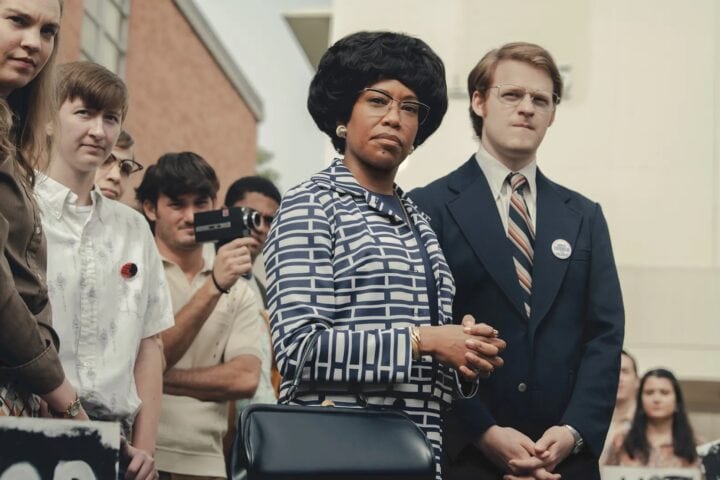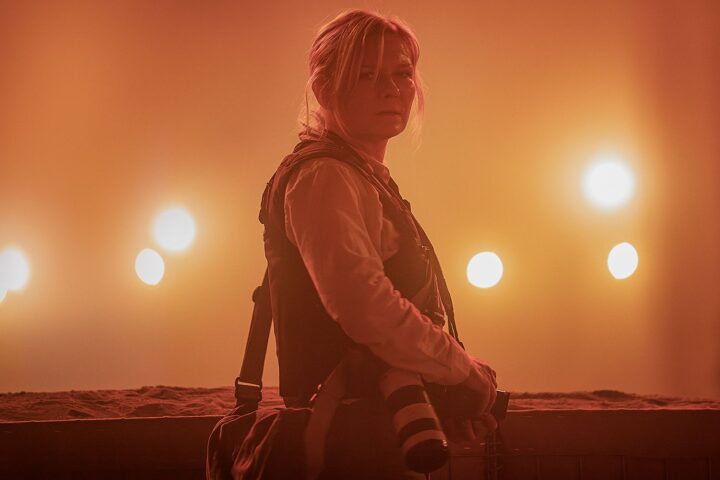We should thank whoever cut the official trailer for writer-director Kobi Libii’s The American Society of Magical Negroes. As infuriating as the film is, it would have been devastating to imagine anyone, but especially people of color, walking into it expecting Jordan Peele-grade social commentary or a Black Harry Potter after the teaser was released and getting this instead. The second trailer sold a more accurate and deterrent bill of goods, as this is, in fact, an interracial romcom masquerading as social satire. But even knowing that Libii’s film would fail at both was a possibility, nothing can prepare you for the reality of sitting through a 105-minute, unchallenged preaching session on the virtues of minstrelsy.
The first five minutes almost play as a warning. A struggling artist trying to sell his latest piece at an art show, Aren (Justice Smith) glides through a sea of white faces toward his creation: a multicolored curtain that, for a brief moment shot in close-up, looks like a celebration of Black hair and braids (or, at least, decent weaves). But no, the piece in question is just a pile of expensive yarn, sloppily arranged on a clothesline. Aren has no message or intent behind it. To the surprise of no one, there are no buyers. It doesn’t help that Aren’s apparent phobia of catching an askance glare from a white person keeps him from trying to talk up his work to a potential buyer. Turns out, his lack of conviction mirrors that of the film.
Disproportionate to the way Barbie was self-aware enough to call out that, maybe, Margot Robbie is an imperfect vessel for a plot point about not being stereotypically pretty, it’s bewildering how The American Society of Magical Negroes is blind to the fact that it’s hinged a tale of how to avoid American racism on a biracial actor who passes the brown paper bag test with, pun unintended, flying colors. There’s no doubt that Aren has experienced racism. But as many have noted over the years, Black people are not a monolith, and the racism that Aren’s likely experienced doesn’t match up with what he ends up raging about in the film’s climax.
A smarter, more insightful film might have made something of Aren taking advantage of light-skinned privilege in mixed spaces. This is a character who actually wouldn’t have to try nearly as hard to make white folks comfortable in many settings. There’s a whole different strata of racial problems that he’d be dealing with instead, especially from his own people (who actually don’t seem to even exist in this film outside of the titular society, despite taking place in Los Angeles).
After the art show, Aren sheepishly tries to help a young drunk white woman at an ATM, but when she loses her debit card, she calls him a thief, and two cartoonishly huge white guys come running to save the day. Fortunately, the whole situation is de-escalated by David Allan Grier’s Roger magically slipping the card back in the woman’s purse and talking Aren’s attackers down. You may wonder at this point: How is it that three tense white people are less worried about the surly six-foot-two Black man in a trench coat than the jittery, wiry, five-foot-10 kid in the argyle sweater? According to Roger, the answer is magic, and 200 years of organized steppin’ and fetchin’, overseen by the titular American Society of Magical Negroes. Their stated goal: to keep Black people safe by making sure they never come across as a threat.
Even if you buy into the film’s main conceit—that Black people have old-timey magical powers, but only in the context of being able to help white people stay calm, and thus Black people stay safe—the fact that it takes Aren the remainder of the film to finally put it together how dehumanizing it is for people of color to completely suppress their wants and needs in order to maintain white supremacy is still pretty infuriating. In the meantime, we follow him as he assumes his new role as emotional fluffer for white folks with preternatural ease. He’s assigned to an employee named Jason (Drew Tarver) working at a social media platform called Meetbox. Aren reassures Jason when he has a crisis of confidence, offers words of wisdom when the new hire is stressing about an assignment, and answers on a dime any time Jason calls.
Aren is tasked with keeping his quarry calm as Jason drafts a pitch to save Meetbox after a snafu where the company’s facial recognition software can’t capture the largely dark-skinned people of Ghana. The conflict stems not from Aren’s constant marginalization, or from some sense of self-respect about his own willingness to bury so much of himself in white spaces, but from the fact that Aren falls for co-worker Lizzy (An-Li Bogan) right around the same time that Jason decides to chase her. But because the Society’s magic powers depend on them protecting white people’s feelings, Aren is conflicted over whether to let the love of a woman into his life. The film’s single good one-liner—beset on all sides by absurd moments that land with enough lead to crack a sidewalk—has Aren grousing about how Jason “colonized” his love interest.
There are plenty of other jokes about “magical negro” tropes, with thinly veiled references to Legend of Bagger Vance, The Green Mile, and the like, but there’s no commentary built into these references. They’re only used as examples of how they help to keep white people comfortable. The American Society of Magical Negroes is also dangerously ignorant of how that lack of commentary is doing the same. The other Black people in the film—aside from the Society’s leader, Dede (played by an almost heroic Nicole Byer)—are sad, surrendering ciphers, seemingly deaf, dumb, and blind to half a century of hard-won progress, even under the threat of institutional murder, which is the excuse perpetually used for the Society’s inaction.
Late in The American Society of Magical Negroes, Grier’s Roger delivers a monologue that tells the story of how Black people had to turn the other cheek to stay alive. It’s meant to play as a testament to the survival instincts of people of color, but in context of the rest of the film, it’s uselessly defeatist. Meanwhile, Aren’s own self-actualization comes across as incoherent as he’s shouted over by the fretting corporate white folks in the background of the scene.
If The American Society of Magical Negroes had just been a romcom, it would’ve been, yes, tired and cliché, but at least mildly charming, coasting on the strength of Bogan and Smith’s chemistry. Instead, it’s an odd, clumsy fit in what’s already a sloppy piece of work. There are versions of this premise relevant to a modern world, but the film’s point of view on the state of race relations feels stuck somewhere around 1954. It has nothing to offer people of color in 2024, though it’s very easy to imagine it making a lot of white people feel nice and comfortable.
Since 2001, we've brought you uncompromising, candid takes on the world of film, music, television, video games, theater, and more. Independently owned and operated publications like Slant have been hit hard in recent years, but we’re committed to keeping our content free and accessible—meaning no paywalls or fees.
If you like what we do, please consider subscribing to our Patreon or making a donation.






.. respectfully, Mr gaming critic sir, I don’t think u “got” even what this film is about, & honestly I doubt if you’re the target audience to begin with, sir..